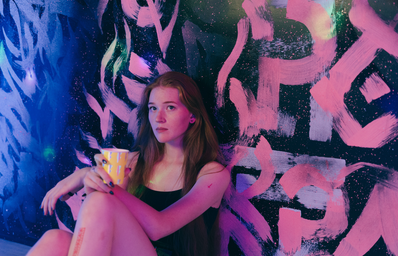Let’s say you take a class. A class in something that seems redundant because it’s something lots of people do everyday with no professional training, like cooking or stretching or basic home repairs. You don’t expect to get much from it because aren’t these things pretty self-explanatory in a point and shoot sort of way? But by the time the class is over, you realise you’ve been doing it all wrong. Because you got the basics all wrong. You were winging everything in an ends-justify-the-means, that-looks-about-right, no-one-actually-pre-heats-an-oven vein of recklessness that completely disregarded the foundational information central to the task, and now that you’ve actually read through the instruction manual, you’re surprised that you’ve made it this far without any major accidents. Your confidence is thrown by your newfound understanding of just how incompetent you are.
I don’t take cooking classes, but I do get the odd NHS phone therapy session thrown my way. And I have been doing self-esteem wrong. Self-esteem, it turns out, is not the same thing as knowing that men think you’re hot.
If men think you’re hot, they will tell you about it. A lot. Often while you are in the middle of telling them about other, non-hotness related things. I have always found this to be the fatal flaw at the heart of One Direction’s ‘That’s What Makes You Beautiful’: if everyone else in the room can see it, she will already be aware of it. Men are pretty obvious like that. And while it may get boring, or patronising, or even a little fear-of-death inspiring, men telling you you’re hot is supposed to be a Very Good Thing, almost as good as them actually being nice to you, and you should be very excited about it. If someone gives you a really expensive present that you absolutely hate, you still feel like you’ve been given something, because everyone else agrees that it has objective value. Being seen as hot is like that. You may not give a damn, but everybody else sure does, and it’s only shrewd to acknowledge that.
When society places so much of a woman’s worth on her looks and has a correlating reward and punishment system in place for her, both on a social and structural level, it’s impossible for her not to internalise it. And when society has a handy, albeit ever-changing and endless, registry of which looks are good and which looks are bad, and hers happen to fall into many of the good columns, she gets permission to have a little pep in her step. She is allowed to be confident. She gets a pass on apologising for her existence.
But understanding you have worth to men is not the same thing as understanding you have worth. Liking the look of yourself through the male gaze is not the same thing as liking yourself. Self-objectification is not the same thing as self-esteem.
The most obvious distinction between the two is that one isn’t so concerned with how you look. It isn’t self-esteem if it shatters with a bad hair day or a bloated stomach. Self-esteem isn’t contingent on your make-up staying in place all day. Self-esteem doesn’t need setting spray. Maybe that’s old news to a lot of people, but it isn’t to me. It sure feels like women and people from the queer community have to spend a lot of time thinking about things from other people’s [read: men’s] perspectives, or listening to their perspectives because they swear they’ve got a point and you definitely haven’t heard it before and there’s no way you’ve guessed what it is before they’ve finished speaking. In all of that noise, it is easy for your own perspective to get lost. It is easy to go your whole life without ever thinking about you, as you.
It’s also easy to think that you’re succeeding at being a feminist just because you can criticise the backwards nature of the beauty standards that you’re expected to meet. But how many of those standards do you continue to hold yourself to regardless? The honest answer, for me at least, is most of them. Men wouldn’t humour me railing against the patriarchy so much if I didn’t.
The impact of the male gaze extends far beyond how we think about our looks, though. It affects every aspect of how we develop. How much of myself was created to cater to people with more power than me? What percentage of my over animated ‘hi!’ was pulled from bubbly female leads written to appeal to men? If I grew up in a vacuum, would I still smile so much? Would I be constantly trying to prove that no I am not a bitch, no I am not an airhead, or would I just…exist? Would I stop introducing myself like a human exclamation point and nix the singsongy voice and eye-squeezing smile and barely-there hair flip? Would I even like pink?
I don’t know the answers to a lot of these questions, but I do know that I don’t blame myself for ending up where I am now. Growing up against a media landscape that conflates female empowerment with looking conventionally hot as hell, how could you not get the two mixed up? And it’s not as if society didn’t encourage my conformity at every step of the way. But at least I’ve learned one thing about myself in all of this: I am not vain, I am just deeply, deeply sexist.


